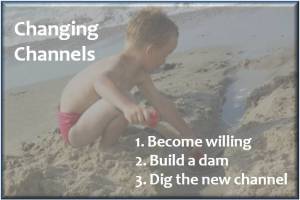 It is easy to get discouraged, working the 12-Step program, if we obsess about a step we are not ready for. Think about it. Wouldn’t it be horribly discouraging to start obsessing about passing a college chemistry class when you are taking 7th grade science? Thinking ahead can paralyze you and keep you from making progress on the step you are working right now. This is especially true if we start worrying about Steps 4,5,8, or 9.
It is easy to get discouraged, working the 12-Step program, if we obsess about a step we are not ready for. Think about it. Wouldn’t it be horribly discouraging to start obsessing about passing a college chemistry class when you are taking 7th grade science? Thinking ahead can paralyze you and keep you from making progress on the step you are working right now. This is especially true if we start worrying about Steps 4,5,8, or 9.
Here is some good news! Each step prepares you for the next. The output of a step becomes the input for the one that follows it. When you are ready to move on to the next step you will WANT to do it. You may not be excited about the footwork you have to do, but you will be very excited as you anticipate the results of doing it.
If you are a newcomer to the 12-step program, you are on Step 1, admitting that you are powerless over the behavior or substance that brought you to the program. Since most of us spent years thinking we were in control and not powerless at all, and trying to prove it by our actions, that can be a tall order! Focus on Step 1 if that is where you are. Read the step in the ARP manual, He Did Deliver Me from Bondage, or one of the 12 Steps and 12 Traditions books. (See my Resources page for more info on these books.) Use the tool of writing to identify material that you can apply to your own life. Colleen Harrison, the author of He Did Deliver Me from Bondage calls it “Capturing”. Here is an abbreviated explanation of how I use this tool.
- As you come across a passage that you feel inclined to highlight, copy it into a notebook.
- Write about what you think the passage means.
- Pray for guidance on how to apply this passage to your life and then write about the impressions you get.
Take the time to thoughtfully answer the questions that appear in the book you are studying. Talk to your sponsor and/or other people who are working the steps about what you are learning. When you think you have learned all you can from this step (this time around), prayerfully ask the Lord if you are done with it and ready to move on. When you get a confirmation, start working the next one.
Getting Stuck
If I am stuck on a step and can’t seem to find the willingness to move on, it usually means that I probably wasn’t really done with the previous step when I started this one. For example, if I am working Step 3, and just can’t seem to find the willingness to turn my will and my life over to the Lord and trust Him so I can start Step 4, I might need to go back to Step 2, and dig deeper for the ability and willingness to embrace the fact that He really CAN deliver me from my situation. If I really believe that He can and will deliver me then why would I be reluctant to ask Him to do so in Step 3?
Input and Output
What did I mean when I said that the output of one step becomes the input for the next? In Step 4 you make an inventory. That inventory contains the things you confess in Step 5. As you work Step 5, and give away your inventory, the person who receives it will be able to help you identify patterns and put together a list of your shortcomings and weaknesses. In Step 6, you become willing to ask the Lord to remove them. Truly, every one of the steps prepares us to work the next step, if we give ourselves to the work with humility and persistence.
- What step are you working on?
- Are you doing it with humility and persistence?
- Are you making progress?
- Are you using the tool of writing?
- Are you talking to others about what you are learning?
- What are you willing to do to move forward?




 In the Church we are taught that in some unfathomable way in the Garden of Gethsemane Jesus somehow experienced and took upon Him every sin, transgression, challenge, feeling, and experience that has ever been or will ever be experienced by any child of God.
In the Church we are taught that in some unfathomable way in the Garden of Gethsemane Jesus somehow experienced and took upon Him every sin, transgression, challenge, feeling, and experience that has ever been or will ever be experienced by any child of God. 


